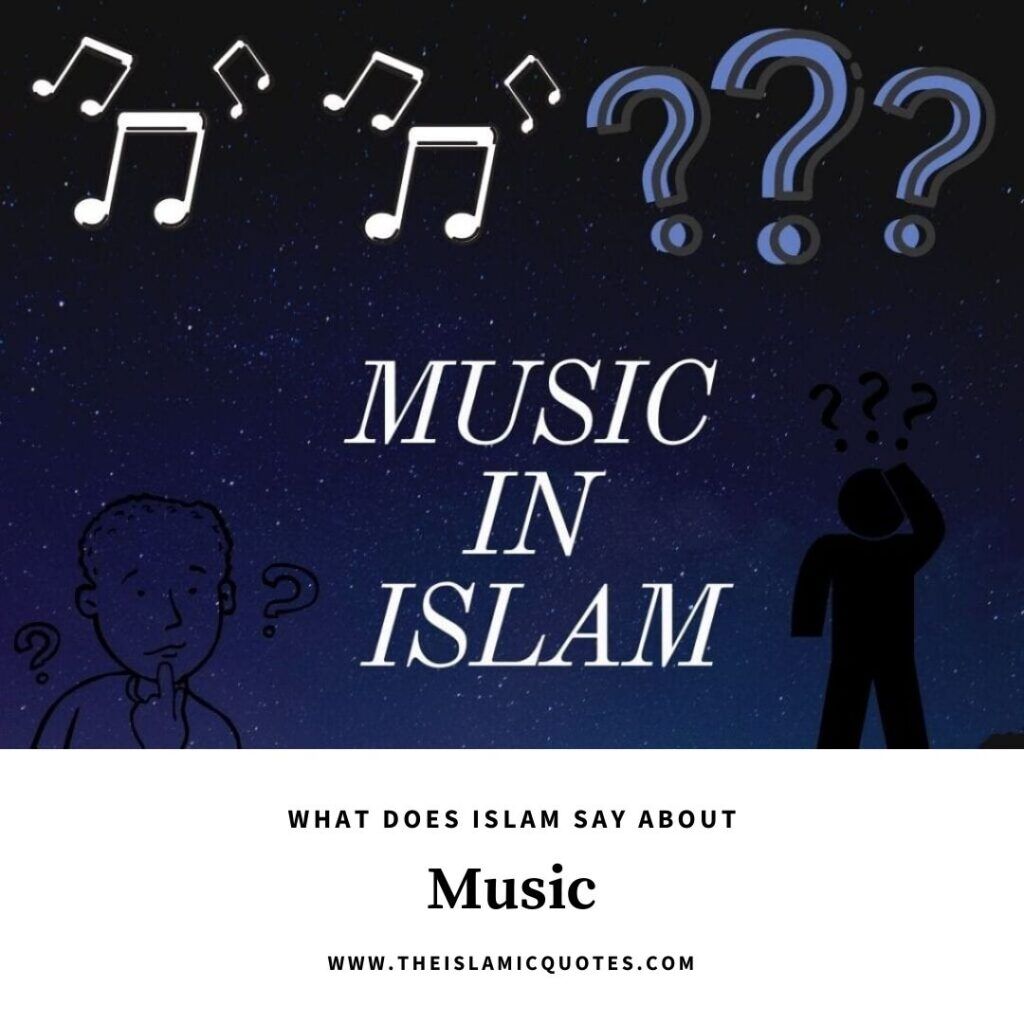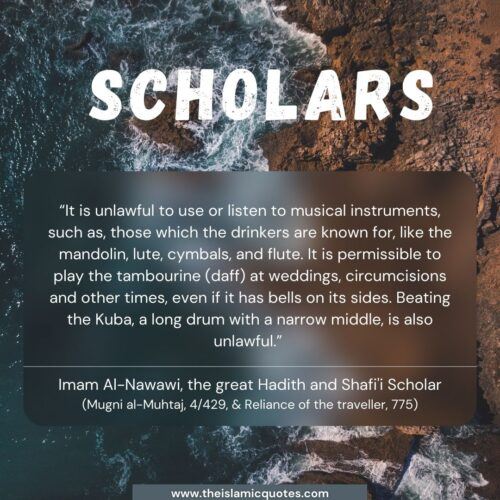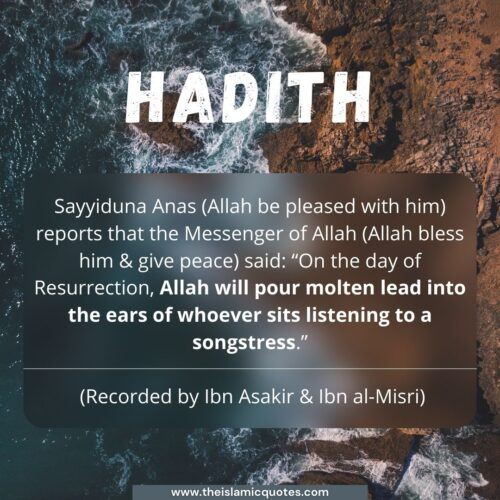Music in Islam: Music has been an intrinsic part of human civilizations for centuries. Emperors have had musicians play in their courts, accompanied by dancers. Artists and record labels have made billions by promoting music and making it a lucrative business with multiple avenues of marketing avenues.
The digital age of the smartphone and the internet has only made music that much more accessible and workable with streaming platforms and YouTube. This has made music a near-constant source of entertainment. Music has engulfed and surrounded us to the point where it is more of an afterthought, where we do not even ponder over what or how we are consuming it.
Is that how it should be? Is that how Allah SWT wants a Muslim to interact with music? If you’re looking for some solid information right from the Quran and Hadith about Islam’s stance on music, then we are confident this article witll prove sufficient. So, let’s get moving.
Can Muslims Listen to Music?
Music and its legality and ethical standing in Islam has recently been a hotly debated topic. However, the interesting and intriguing thing is that this topic was not one of disagreement and variance in the times of the Companions or the Tabaeen and Taba Tabaeen. It has been a topic where much of the scholars have always had unanimous agreements throughout much of Traditional Islamic History.
Thus, in a conflicting situation like this, what makes us Muslims is our relentless pursuit of the Truth, the realization that seeking answers should always be prioritized before personal comfort and ease.

9. What is Music?
Music in Islam is divided into two categories, natural and artificial music. Natural music is the sounds of nature and animals that surround us and are ever-present like gushing water, howling, and whistling of the wind, birds chirping, and many more. These sounds have been created by Allah and listening to them is not haram or unlawful.
The other kind is artificial or man-made music and songs that include the use of both or either vocals or musical instruments. In the normal cultural and global understanding of the term music, it is this definition that is referred to.
As for the first type, there is no harm in it. These are melodies of nature that speak about the beauty of Allah SWT. The Prophet ﷺ told us that everything in the heavens and the Earth glorifies Allah SWT. So, all of these beautiful melodies of nature are actually Allah’s creation doing the Dhikr of Allah SWT.
Thus, these are not only lawful and permitted to listen to, but a man should take out time to listen to the beautiful voices of nature. Because, as said, these are the glorification of Allah SWT. No wonder man feels good whenever he hears them, right?
The psychological effects of the melodies of nature are also well-known and well-acknowledged. Feeling low? Sit by the river for a while or hear the birds chirping in the morning and see how your mood lifts us. Nature is therapeutic, because nature remembers its Lord and glorifies Him.
In the following write-up, however, we will be talking about the stance of the second type of Music from the Islamic perspective, man-made music.
8. Music in the Light of Quran
Allah SWT says in the Quran:

Now, before we start understanding this Ayah, remember that the Quran was revealed to the Prophet ﷺ. The Prophet ﷺ was the first teacher of the Quran and the Sahaba were the first students of it. The purpose of the Prophet ﷺ being sent in this world included him teaching the Quran, along with reciting it. Allah SWT says:
“Our Lord, raise amongst them an apostle from among them, who will recite to them Your signs and teach them the Book and wisdom and purify them. Indeed You are the All-mighty, the All-wise.”
Surah Baqarah, 129
Thus, to best understand the meanings of the Quran, we will look at the explanation provided by the Prophet ﷺ. After that, we will take the understanding of the first and best students of Quran to understand the Quran, ones who directly studied from the Prophet ﷺ, the esteemed Companions of the Prophet ﷺ. This is the closest and most assured way to finding the truth about the meanings of the Quran.
Because let’s put it into perspective. The Companions of the Prophet ﷺ would never utter anything about the Quran without knowledge. They are the rightly guided people who benefited directly from the companionship and knowledge of the Prophet ﷺ. Thus, after the Prophet ﷺ, his companions are the most learned in the matters of Deen. So, what do the rightly guided companions have to say about the above-mentioned verse? Let’s take a look.
The great Companion Abd Allah ibn Mas’ud explains about the word “idle tales”: “By Allah its meaning is music.”
(Sunan al-Bayhaqi, 1/223 & authenticated by al-Hakim in his Mustadrak, 2/411)
The Companion Abdullah Ibn Mas’ud said: “I swear by Him besides Whom there is no God that it refers to singing.”
(132/5)
The great Companion and exegete of the Qur’an, Sayyiduna Abd Allah ibn Abbas (Allah be pleased with him) states: “The meaning of the word is music, singing and the like.”
(Sunan al-Bayhaqi, 1/221& Musannaf Ibn abi Shayba, 132/5)
From the above mentioned statements, we understand that many Sahaba understood this verse to depict the prohibition of music. It is naturally understood that these opinions of the Companion are not based on their own whimsical opinions. Rather, they are based on the knowledge and guidance they received from the Prophet ﷺ.
Some people put forth the claim that this Ayah refers to ‘things that prevent one from the remembrance of Allah SWT.’ While the verse could potentially mean that, it does not contradict from its meaning of music. Because music too serves to distract and prevent a person from remembering his Lord. So that meaning is a more general interpretation. Ofcourse, among the list of things that prevent one from remembering Allah SWT, music is at the top. We will discuss more on that below.
Now, take a look at this ayah from Surah Furqaan:

About this verse, Imam Abu Bakr al-Jassas narrates from Imam Abu Hanifa that the meaning of falsehood is music and song. (Ahkam al Qur’an, 3/428)
Here is the third Ayah which one should look at when understanding music from the Quran. Allah SWT addresses Shaytaan and says:

A very renowned and well-accepted exegete, Mujahid had interpreted the word ‘voice’ to mean music, singing, dancing and idle things. (Ruh al-Ma’ani, 15/111)
In this verse too, some prefer the general meaning. But, again, the meaning of music, dancing, singing all fall under the broad spectrum. So, there is no contradiction in the two meanings.
7. Music in the Light of Hadith
There are numerous narrations from the Prophet ﷺ about the prohibition of music. It’s a theme that can be seen across multiple Hadiths. In fact, some scholars have compiled as much as 40 Ahadith on this topic. Some of these are authentic (Sahih), while others are sound (Hassan). There are even some weak (Daeef) Hadith on this topic.
Nevertheless, if 40 Hadiths speak about a similar, overlapping theme, isn’t that enough to establish a ruling on a certain matter?
The fact of the matter is that it is more than enough. This is why the majority of the scholars in the Islamic history have been unanimous about the ruling of music and singing.
Let’s take a glance at a few Hadiths.


In the Arabic text of the afore-mentioned Hadiths is the word ‘Ma’azif.’ According to scholars of the Arabic language, the word refers to musical instruments.
Moreover, just to look at the first Hadith deeply, one can’t help but notice that music is mentioned with the likes of major sins such as adultery and alcohol. That speaks volumes about the status of music in Islam.
Furthermore, when the Prophet ﷺ makes the prophecy that some people from the Ummah will make musical instruments lawful (halal), this indicates that in the true Shariah, musical instruments are actually Haram. Because, why would the Prophet ﷺ otherwise talk about ‘certain’ people who will hold musical instruments to be halal? If they were truly originally halal, then the first people to hold them halal would be the Companions and that would be nothing problematic. Recall that all these Hadith are transmitted by the Companions themselves.
The language of the Hadith, thus, tells us that they are prohibited. From this, we also learn that considering musical instruments to be halal is the same as considering adultery to be halal; a major sin.
Objection 1
Some people raise objections on this Hadith that the Prophet ﷺ did not possess the knowledge of the Unseen, or the future. On the basis of this claim, they doubt the authenticity of this Hadith.
The very simple answer to this is that the Prophet ﷺ only knew about the unseen and the future what Allah SWT Himself told him. These are among the miracles of the Prophet ﷺ. Allah SWT told him about certain events in the future that will happen. So, while the Prophet ﷺ intrinsically doesn’t possess knowledge of the unseen, He knows what Allah told him, and him alone. And, this Hadith contains one of those things.
Thus, rejecting this Hadith based on this objection is a misleading thing to do.
Objection 2
Some people claim that this Hadith means that music is only lawful when it is combined with alcohol, adultery and silk (note that wearing silk is prohibited for men in this world and permitted for women). They claim that on its own, music is permitted.
However, that isn’t true. Because if it were then it should apply to all things, right? Adultery should only be prohibited if done with the other three. Singly, it should be permitted. However, it is well-known that that’s not the case.
Thus, if this logic cannot be applied to the other three things, it cannot be applied to music either.
From the second Hadith, we also learn that making music permissible can lead to grave punishment; being turned into monkeys and swine, and being swallowed by the Earth.
If music were in fact such a lenient matter where there’d be much space for differences of opinion and casualty, then the Prophet ﷺ wouldn’t have used to describe such horrific punishments for those who make it halal. This is a point to ponder upon.
There are more Ahadith in this regard, which are as follows:


6. The Hadith About Singing on Eid
There is a confusion created regarding the permissibility of music from a Hadith where few young girls are seen singing on the occasion of Eid and the Prophet ﷺ lets them do it.
Many people establish the permissibility of music from this Hadith.
The Hadith follows as:

Many scholars of Hadith (Muhadditheen) have commented on this Hadith that it cannot be used to justify the permissibility of Hadith. The reasons are as follows:
- For one, these were young girls that hadn’t even reached puberty. It is incorrect to use this to justify elder, mature women singing and dancing, both publicly and privately
- Secondly, there were no musical instruments used. Thus this Hadith cannot justify the use of musical instruments
- Thirdly, the content of the song was regarding war. They were basically reading war poetry in a lyrical tone, which is perfectly alright in Islam. Thus, it cannot be used to justify the singing of all sorts of songs
- Moreover, they weren’t professional singers, as the words of the Hadith indicate
Had they been so, or had they been singing verses of a romantic theme or maybe other content that is not in line with the teachings of the Quran, then the Prophet ﷺ would have definitely objected to it.
Moreover, a point to ponder is why did Hazrat Abu Bakr stop them? Note that this Hadith is of the Madani life, after the migration to Madinah, because that is when Eid became a festival for Muslims. So, Hazrat Abu Bakr has been attaining the knowledge of Islam for a long time now- more than 10 years! Why did he object?
The very fact that he scolded them and asked them to quieten down, specially around the Prophet ﷺ, indicates that among the Companions, it was understood that music, singing and dancing is prohibited in Islam. Why else would he object to this, especially now that he had become knowledgeable in Deen having spent more than 10 years in the company of the Prophet ﷺ?
The significance of this incident lies in the fact that it led the Sahabah to learning about the kind of singing that is permitted in Islam. We will discuss that ahead.
5. The Use of Tambourine (Daff)
Another Hadith from which claim is made about the permissibility of musical instruments is the Hadith which permits the use of the tambourine.
Once again, this Hadith cannot be used to prove the permissibility of various other musical instruments such as drum and harmonium.
One must also remember that the tambourine at the time was designed not merely as a musical instrument, rather as a means to make announcements.
This is why it was prescribed to be used at Nikaah, because Islam has preached that Nikaah be announced, so a means of doing it is by using the tambourine.
Thus, the Jurists have stated that tambourine can be used at Nikaah for announcements. However, if there are other means of announcements then the use of tambourine can be left too. Apart from Nikaah too it can be used, but it’s better to stay clear of it.
In either case, it is incorrect to use the afore-mentioned Hadith to permit the use of musical instruments.
4. Sayings of the Scholars About Music



3. The Final Statement About Music
From the above-stated Quranic verses and sayings of the beloved Messenger ﷺ and sayings of the Jurists, the concluding statement about music is as follows:
- Musical instruments exclusively designed for the purpose of entertainment and dancing are unlawful irrespective of time, place and occasion. They have a charm and pleasure of their own that can be enjoyed even without any accompanied singing. These include drum, violin, guitar, flute, harmonium, piano, string, etc (There is a consensus of the entire Ummah on this, since the first century).
- Tambourine (daff) is allowed at wedding occasions and other occasions as well
- Singing without musical instruments is permitted, given that the topic of lyrics is correct.
- Singing that leads to sin or prevents one from performing obligatory duties is not permitted
- Singing that is accompanied by other sins is also unlawful, such as being sung by a non-mahram woman, etc.
- Permitted lyrics would be all based on good values and virtues, excluding lyrics about love and passion (towards a na-mahram), women, sex, drugs, addiction, polytheistic concepts (shirk). Lyrics that make fun of Islamic beliefs, such as heaven and hell, would also not be permitted.
These are the overarching principles governing music. Note that the same rulings apply to all sorts of singing and music, including Sufi music, Qawalli, Islamic Nasheeds, and the like.
Even if they claim to be religious and Islamic, but contradict any of the above-mentioned rulings, they would not be allowed in the light of the above-mentioned Ayahs and Hadiths.
2. The Harmful Effects of Music
Everything that is prohibited by Allah SWT has great benefits for humankind. We should always remember this, even when all we can see are benefits. Because, remember, our intellect is limited in its capacity.
Have you ever stood at the shore, looking at the beach? It appears to extend till the horizon, right? Can you see beyond that? Ofcourse, no.
But, we know from our knowledge that the sea extends way more than we can see, possibly till the other shore on another continent.
Just like our eyes cannot encompass the vastness of the sea, our intellect cannot encompass the death and reality of everything. We are only often able to grasp the surface only, just like our eyes.
Allah SWT’s knowledge and wisdom encompasses everything, and it is out of it that He guides us about what to do and what not to do. Thus, our job is to believe in and trust His knowledge and follow it.
So, when He tells us through His Prophet to not listen to music or play musical instruments, then there definitely must be harms that He is saving us from. What are these harms? Let’s see.
Breeds Hypocrisy

Hypocrisy is something we must try to stay miles away from. According to Hadith, the lowermost portion of Hell is reserved for hypocrites.
Entices Towards Zina
Music is well-known to arouse a person’s emotions, excitement and sexual desires. This is a proven fact from multiple researches. And the Quran not only prohibits Zina, but everything leading to it. Allah SWT says:
“And do not come near to adultery; surely it has been an obscenity and odious as a way.”
(Surah Bani Israel, 32)
Encourages Heedlessness of Allah SWT
One of the primary harms of music is that it distracts a person from remembering Allah SWT. Music gives people a high, they come in a state of pleasure where they forget about the reality for a while. This leads to heedlessness (Ghaflah).
Even the marketeers realise this and that is why they play music in shops and markets. It is an understood concept in Consumer Psychology that music has the effect of making one be less mindful of the things he does and the decisions he makes, thus, people are more likely to buy products without much thought when there’s music playing in the background.
This is precisely what Allah SWT doesn’t want of us. He wants us to always remain mindful in life and take all decisions utilising our rational power. Islam encourages one to remember Allah SWT every second of every day. And, as established, music prevents a person from doing so.
In this way, when one is unable to remember Allah SWT frequently, he is more prone to fall into various sins, because that’s just what heedlessness does to a person.
Instilling Un-Islamic Values
Music subconsciously instills un-islamic values in the hearts and minds of Muslims. Much of the lyrics of songs follow a general theme of love addiction, women, fornication, drugs and freedom.
But, one must remember that even if the lyrics are good, they will have to follow all the above-mentioned criteria to be permitted for one to listen.
These are some of the primary harms of music. One could argue that there are some benefits of it as well, but the harms of music are way more than any possible benefits. Hence, the prohibition.
1. How to Stop Listening to Music?
We live in times where music is present at every nook and cranny of the world. It’s difficult to find a place free of musical influence. Such that it can seem almost impossible to leave music.
But remember, Allah SWT does not burden a soul more than it can bear. Just the fact that Allah wants you to leave it means that you can do it!
Here are some tips to help you leave music:
- Believe in yourself
You can do it. Trust us. Nothing is impossible if you set your mind to it.
- Leave it one song or one singer at a time
You may have an exhaustive list of music and songs. Do not take a huge leap. Chances are, you’ll fall back. Leave one song or one singer at a time. Keep building up on it!
- Remind yourself of the punishment of listening to music
The Prophet ﷺ said:

- Listen to Islamic Nasheeds instead
Try to replace your hours of music with nasheeds. If you always listen to songs while going back from work, listen to something more beneficial, such as nasheeds. There are many wonderful melodious nasheeds out there.
- Spend time with Quran
The more your heart will connect to the Quran, the less it will want to connect with music. Play the inverse proportion game with your heart. Gradually move from music to Islamic nasheeds to Quranic recitation. You heart will turn, give it its due time.
- Find people with the same goal
Find out people who are also trying to leave music, or convince your friends about ite prohibition and harms. Do it together as a team! You will be able to strengthen each other and motivate each other when the temptation kicks. You can also keep yourself busy in other activities such as these Halal Activities & Fun Islamic Hobbies for Adult Muslims.
- Remind yourself of the Prophet ﷺ
What did the Prophet ﷺ do when music fell into his ears? Read this:

- Keep trying until you succeed
It’s okay if you fail at the first few attempts. Try, try again. After all, the Shaytaan is also trying to not make you leave it. Keep trying until Shaytaan gives up. You can definitely do it! Allah SWT will also send help your way.
Follow all these tips and you’ll be clean of music in no time with the will of Allah SWT.
If you’re looking for alternatives to listening to music, I recommend that you go through these Halal Activities & Fun Islamic Hobbies for Adult Muslims.
Final Words
So you see, by consensus of majority Scholars from the time of the Prophet ﷺ till today, music is prohibited in the light of Quran and Hadith. There may be a few deviations here and there, but the majority is definitely unanimous on this matter.
Hence, let’s follow them to protect our Emaan in these times of trial and fitnah. Every pleasure of this world can be sacrificed for the pleasure of our Rabb. So, are you ready for the challenge?

Quran Is The Holy Scripture Of Muslim. Quran Is The Last Message Of Allah For The Whole Mankind. It Was Revealed On Prophet Muhammad Peace Be Upon Him. Quran Was Revealed Through The Agency Of Angel Gabriel In Arabic Language It Comprises Thirty Parts. Quran Explanation Is Available Almost In Every Language Of The World.
Surah Kahf is the best of the holy Quran, Muslims read this surah daily especially on Friday this surah read mostly, listening and reading Quran is best thing instead of music…
Masha Allah this post is very informative
that is most beutifull surah thank you…